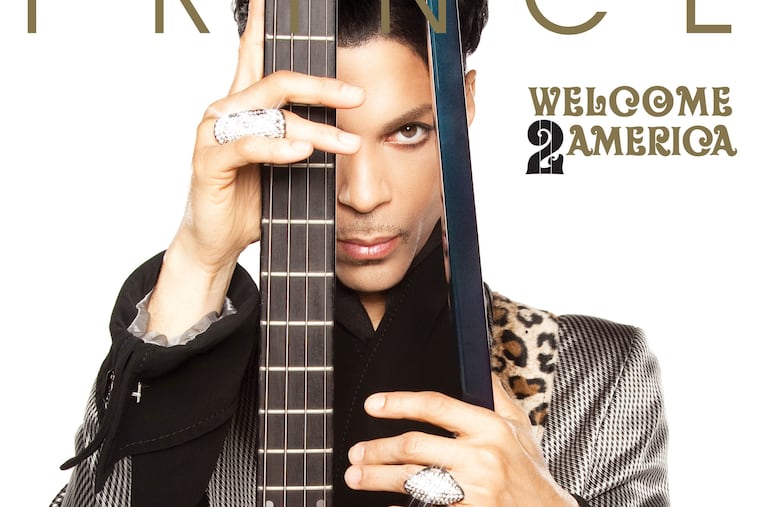Prince’s new album from the Paisley Park vault is too good to remain unheard | Reviews
Yola and Lump also have noteworthy new releases.

Prince
Welcome 2 America
(Columbia / Legacy *** 1/2)
Since Prince’s death, the release of music that he kept private while alive — locked away in the overstuffed vault under his Paisley Park studio — has been steady: The intimate Piano & A Microphone 1983 and maximalist Sign O’ the Times box have been highlights. Welcome 2 America is the first release conceived as an entire album.
It expands on the 2010 song “Welcome 2 America” that detailed the ills he saw plaguing the nation, ranging from systemic racism in the “land of the free, home of the slave” to a digital “information overload” where no source of news is trustworthy and “truth is a new minority.”
Prince liked the taut funk-rock song so well that he named a tour after it. But he didn’t reveal that he had recorded an entire album under that name.
Besides the eerie quality of hearing Prince speak to our times from beyond the grave, Welcome 2 is consistently compelling. The band — bassist Tal Wilkenfeld, drummer Chris Coleman, and keyboard player Morris Hayes, with Prince on guitar — is crisp and efficient.
The songs shine, from mysterious riddles like “1010 (Rin Tin Tin)” to randy double entendres such as “When She Comes.” The pop prayer “One Day We Will All Be Free” and surprise cover of Minneapolis post-punk band Soul Asylum’s “Stand Up and B Strong” deliver inspirational uplift.
And all of it, of course, creates a moral quandary: Should we really be hearing this?
Many conscientious fans will ask themselves that question before answering with a selfish justification: Wouldn’t it be even more wrong, though, for music this good to remain unheard?
— Dan DeLuca
Yola
Stand for Myself
(Easy Eye Sound ***)
“Don’t let me be misunderstood,” Yola pleads on “Starlight.” That’s not likely to happen.
The 38-year-old British singer was already a seasoned performer when her 2019 solo debut, Walk Through Fire, announced her as a formidable diva with a vintage air and timelessly potent songs. Stand for Myself takes things up a level.
She’s again working with producer Dan Auerbach and many of his familiar Nashville musicians, and again cowriting with the Black Keys front man and others. But the country-soul trappings of the debut have largely been replaced by a more orchestral pop sound, on numbers like the string-kissed “Starlight,” the torch ballad “Great Divide,” and the reflective “Like a Photograph.”
While the rootsier touches are less prevalent, the new approach heightens the drama without descending into melodrama, as Yola presents a portrait of a woman who, as she puts it in the title track, is “stronger than anyone, but still so fragile.”
It’s no surprise she’s been cast as gospel dynamo Sister Rosetta Tharpe in an upcoming Elvis biopic. She breaks through the silky surroundings and belts with real ferocity for “Break the Bough.”
The message is clear: This is a woman who maintains an abiding faith in her own worth, and will not give in or give up.
— Nick Cristiano
Lump
Animal
(Partisan, ***)
While Laura Marling was working on Song for Our Daughter, her Grammy-nominated album from last year, she also returned to her Lump collaboration with Tunng’s Mike Lindsay, setting aside her folk-singer persona and finger-picked guitar playing to write and sing to Lindsay’s synth-based music.
Whereas Marling’s solo work is cerebral and direct, her writing here is instinctive and nonlinear: Animal is full of id-based desires, dreamlike visions, and imaginative leaps.
“Deliberate acts of pretension / have shackled your arms to the deck,” she sings in the propulsive “Climb Every Wall.” She might be psychoanalyzing herself and relishing, with Lindsay, feeling unshackled from her usual modus operandi. (Although that would sell short her artful, insightful solo work).
She is a precise, clear-voiced singer, and here that often works in juxtaposition to her subject matter. She sounds calm and controlled even when singing of primal lust in the title track amid Lindsay’s tumbling rhythms and chirpy keyboards.
Lindsay relies heavily on a vintage Eventide H949 Harmonizer, which was also the base for David Bowie’s Low, and the opening moments of “Paradise” and “Oberon” allude to Low’s instrumental second half.
For Lump’s 2018 debut, he provided tracks that were moody, somber, and a bit abstract. Animal is much more extroverted: its rhythms more prominent and its hooks more overt, even tipping into a new-wave bounciness on “We Cannot Resist.”
— Steve Klinge